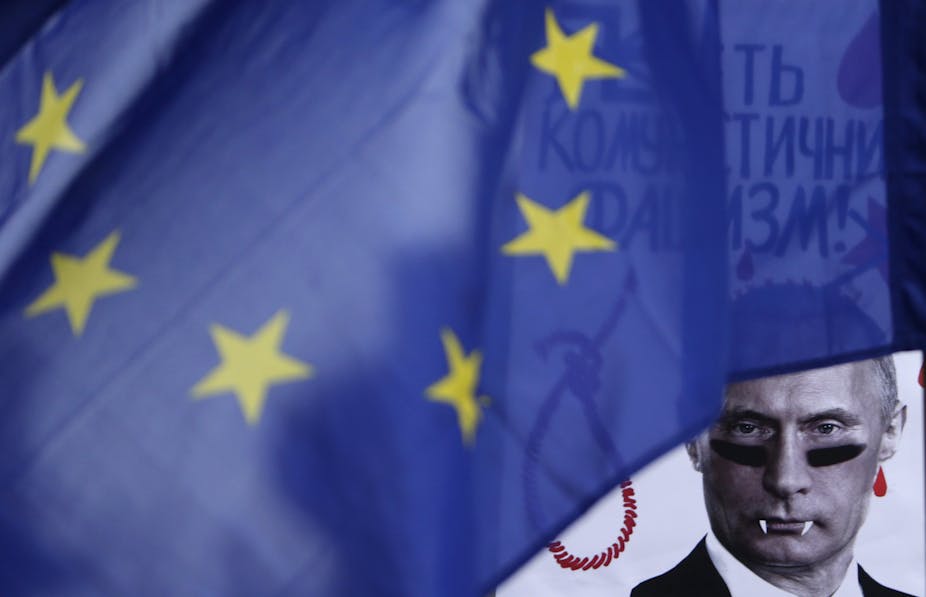Hilary Benn, Labour’s shadow foreign secretary, has warned that a Brexit would play into the hands of Vladimir Putin. Speaking in London about the forthcoming EU referendum, Benn sought to make a patriotic case for keeping the UK in the European Union.
But this speech had none of the rhetorical flourish of Benn’s House of Commons performance last year, when he made a passionate case for military intervention in Syria. Nor did he address widespread concerns about the EU that resonate with many (Labour) voters who are minded to vote for Brexit.
A matter of security?
Benn’s speech was certainly thoughtful. He rightly condemned “narrow nationalism” and warned that Brexit would significantly diminish the UK’s position and influence in the world. Membership of the EU acts as a force multiplier, enabling London to shape the globe’s single biggest economic space and conclude multilateral trade deals. “And Britain is always at its greatest when we are a confident and outward-looking trading nation,” said Benn.
Close co-operation with European partners, he argued, is also vital for dealing with big problems that need collective action – from terrorism, to crime, to climate change.

One of his most convincing arguments was about EU-wide agreements on employment rights – including paid holidays, improved maternity and paternity leave and limits on working time. This has not just convinced the trade union movement to back Europe but also prevented “a race to the bottom that globalisation, left unchecked, could bring”.
Benn also drew a connection between economic and national security. He said Europe’s twin promise of prosperity and peace after the two world wars was a great achievement that should “never be taken for granted”. This led him to argue that the EU, alongside NATO, is key to protecting Europe from the current threats of terrorism and Russia’s actions in Ukraine.
But the pro-Europe campaign needs to be stronger on these crucial questions. To warn that Brexit would play into the hands of Putin is to make a negative case for staying in that is unlikely to mobilise undecided voters.
Surely it is much more persuasive to suggest that Britain in the EU can help defend European civilisation against the forces destroying Syria and Iraq and now taking over Libya?
Benn is certainly right to lament the civilian casualties of Russia’s bombing campaign, but he himself said in his now famous House of Commons speech that Islamic State is the fascism of the 21st century that needs to be defeated.
Russia’s game-changing intervention has provided some military leadership in a situation where the West’s strategy was muddled. It has prevented the collapse of the Syrian state and taken the fight to IS and the other terrorist groups that benefited from the support of Western allies such as Turkey, Saudi Arabia and the Gulf States. Whatever disagreements the UK has with the Kremlin, the fight against IS in Syria requires determined cooperation across the whole of Europe, and that includes Russia.
Wrong audience?
An opportunity may have been missed here to engage both outers and undecided voters who have legitimate concerns about the EU. This is particularly true for many (former) Labour supporters who have been left behind by the global economy and technological change – people who left school early and lack academic or vocational qualifications. Continued EU membership can help address both economic uncertainty and cultural anxiety – widespread fears that certain values and ways of life are threatened by the forces of transnational markets.
The places where Labour is doing well tend to be much more pro-European. These are the metropolitan areas in England, especially London and Manchester, as well as the towns and cities of Wales. But everywhere else Labour is struggling, and this often coincides with places where people are more eurosceptic.
Benn’s speech could have acknowledged more strongly that the unity of both the UK and the EU is under growing strain from the forces of globalisation, nationalism and the effects of migration. Faced with the prospect of further devolution to Scotland and growing EU centralisation, many English voters are increasingly worried about national sovereignty. Even if Britain votes to stay in the EU, a vote to remain might reinforce English euroscepticism – we saw a surge in support for the SNP following the referendum on Scottish independence.
Unless Labour speaks to these concerns, it is hard to see how it can escape unscathed from the referendum debate, never mind start winning back trust and support from those whose vote it needs to get back into power. Benn is right to try to make a positive, patriotic case, but he could have done it more forcefully.

